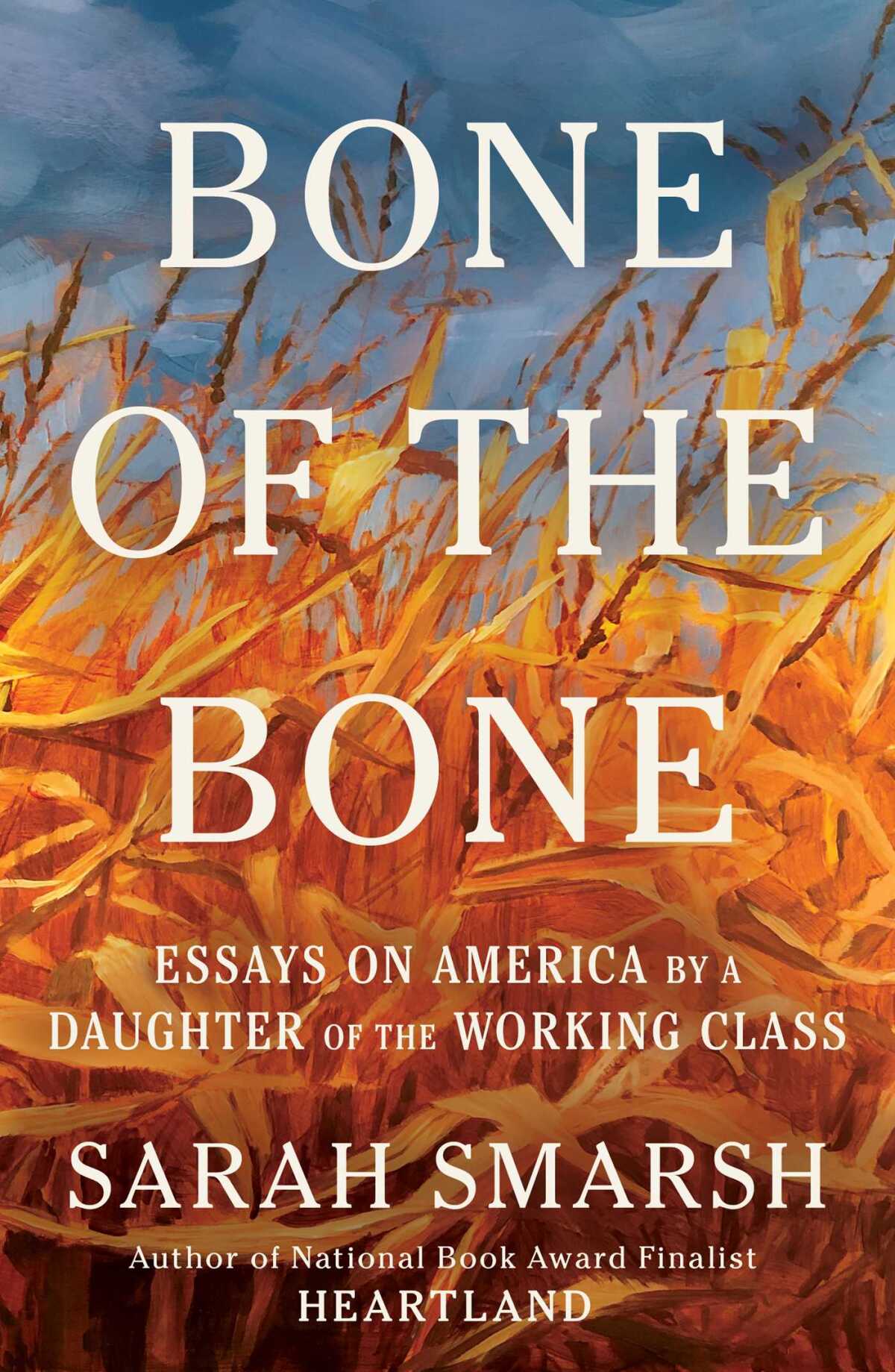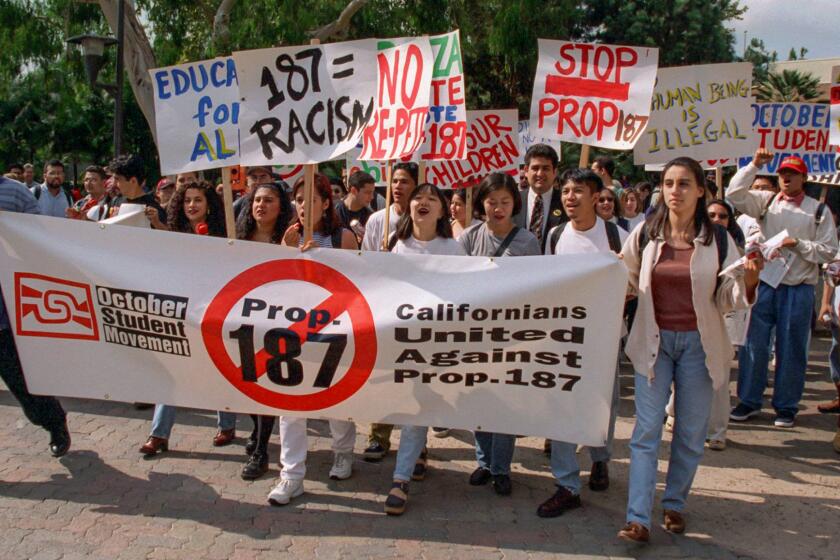What national media get wrong about ‘red states’ and the working class

- Share via
Book Review
Bone of the Bone
By Sarah Smarsh
Scribner: 352 pages, $29.99
If you buy books linked on our site, The Times may earn a commission from Bookshop.org, whose fees support independent bookstores.
To topple the walls that divide Americans, we must first understand them. In the essays of “Bone of the Bone,” journalist Sarah Smarsh combines memoir with political analysis and a critique of journalism to reverse-engineer those cultural divides.
The descriptors “red state” and “blue state” have always been inaccurate, she says. Worse, calling huge swaths of the nation “Trump country” oppresses the voices of resistance, especially those within the white working class.

What’s missing from most news coverage, Smarsh argues, is the tradition of journalism for which she has been awarded prizes and which earned her the admiration of President Obama. “True story comprises two strands, spiraling: the specific and the universal,” she writes. Her stories uncover truths about the economic structures and political decisions behind the individual stories of those whose lives are affected.
Much of the reporting on working-class America has fumbled badly in recent years, including in coverage of Donald Trump’s 2015-16 campaign: National reporters did not understand the terms with which they labeled the purported billionaire’s followers. As Smarsh writes: “The trouble begins with language: elite pundits regularly misuse ‘working class’ as short-hand for right-wing White guys wearing tool belts.”
Humor mixes with a deep understanding of American foibles and the human heart to produce a riveting novel of ideas.
Because so many local newspapers have gone out of business in the internet age, most of the country has far less reporting from journalists who intimately know the local communities. Instead we get national publications such as the New York Times sending a correspondent for a day or a week, parachuting into a community and — all too often — mostly reporting on the people whose opinions fit a preconceived narrative.
During the presidential primary in 2016, while national journalists constantly seemed to be reporting from some Ohio diner full of disaffected white men, an ethnically diverse working-class coalition of 26,450 Kansans overwhelmingly backed Sen. Bernie Sanders (I-Vt.) to be the Democratic nominee — far more votes than Donald Trump received in the Republican race (17,062). Two years later, Kansans elected a Democratic governor. So why have the national media and the Democratic Party failed to focus on Kansas and similar diverse states? Because in representing the working class as a monolith, vital stories and organizational opportunities are ignored.
The fast-growing electorate is changing both within the state and across the country, shifting from immigration to economic concerns.
The failure to understand Kansas politics continues: In 2022, when Kansas voters overwhelmingly turned out to vote to protect abortion rights, many in the national press were surprised, then quickly pivoted to examine how women’s rage at the loss of bodily autonomy had influenced even such a “conservative” place.
Smarsh, who lives in Kansas, knows better, writing that there was “never a Trump country at all” but instead, “like many ‘red states,’ Kansas is a gerrymandered, dark-monied place where election outcomes may have more to do with who votes and whose votes are counted than with the character of the place.” Tapping local expertise and including the stories of individuals helps to inoculate journalism against such mischaracterizations.
Smarsh’s ability to interweave stories — including aspects of her life — places her in the tradition of working-class journalism exemplified by Studs Terkel, Barbara Ehrenreich and others. Writing about those whose work is essential but whose humanity is ignored has allowed Smarsh to expose many Americans’ internalized class prejudices and fears.
This is why “Bone of the Bone” resonated for me. As a working-class kid, I grew up close to many of the issues Smarsh describes. As an adult now and a writer, I see that many journalists covering the working class don’t have relevant life experience and haven’t put in the work to understand others’ lives.
The deep empathy that animates Smarsh’s prose combines with a rigorous intellect committed to uncovering and explaining structural causes of our current cultural moment. Her 2014 essay “Poor Teeth” thoughtfully separates a convenient elitist myth from poor Americans’ painful reality.
In America today, “poor teeth” often result from a lack of access to dentistry, which is not covered by medical insurance; a lack of nutrients in early childhood; lack of access to fluoridated water; and the consumption of cheap calories or junk food, which Smarsh says she craved as a child “for dopamine production in a difficult home.” Paying for orthodontia is unimaginable to many Americans. Smarsh writes that she was fortunate that her permanent teeth came in straight, although she spent years with tooth and jaw pain that her family couldn’t afford to have treated.
Contrast that with the shorthand of many media depictions, in which being “toothless” is seen as a symptom of moral turpitude, a lack of care of self, possibly a meth addiction. It’s one of many comforting narratives the “haves” tell one another about the “have nots” — such as when they pretend Type 2 diabetes is attributable to bad choices, or imagine that poor nutrition is a result of impulsiveness rather than affordability, or assume that healthcare is available for anyone who will work to get it. Smarsh’s essays (one of which quotes me) convey that she is fed up with such shallow and lazy dismissals of inequality.
Smarsh was the first in her family to graduate from college, and her experience rebuts the right-wing propaganda that college education brainwashes students into liberal views. For her, it was stark inequality during and after college that changed her politics and attuned her to social injustices. She felt keenly the unfairness of “excelling on campus while paying my own way through school and then graduating into poverty for lack of social capital” while “less capable children of affluence walk into prestigious internships and lucrative jobs.”
In “How Is Arguing With Trump Voters Working Out for You,” Smarsh shares the story of Megan Phelps-Roper, granddaughter of Fred Phelps, who founded the Kansas-based hate group the Westboro Baptist Church. Phelps-Roper was raised in a community dominated by her zealot grandfather, whose virulent hatred for LGTBQ+ people drove the group’s repulsive protests and drew national attention. Smarsh writes that Phelps-Roper’s childhood and restricted education meant that her ability “to assess information had been thoroughly perverted.” In an interview, Phelps-Roper recounted friendly strangers who “had grace for me when I seemed not to deserve it,” people whose willingness “to suspend judgments long enough to have those conversations with me completely changed my life.” She went on to renounce the hate group.
In the “write them off” tenor in arguments of national divides, reaching out to someone like Phelps-Roper would be seen as hopeless. But people are reachable, Smarsh insists.
She argues that a combination of factors has eroded opportunities for Americans to understand each other. Millions live in areas of the country laboring under economic inequality, state-imposed educational restrictions and election interference. Elected officials from there do not represent most constituents’ opinions or interests. And yet when outsiders affix labels such as “Trump country” or “red state,” they ignore the existing solidarity and chances for further empathy to develop.
Ascribing monolithic characteristics to diverse individuals fuels anger on both sides. The smugness of those who live in privilege alienates those who do not and furthers right-wing aims to divide and conquer the country.
Blaming the residents of “red states” for their challenges is just a modern iteration of “Let them eat cake.” After such rhetoric, revolutions tend to follow.
Lorraine Berry is a writer and critic living in Oregon.
More to Read
A cure for the common opinion
Get thought-provoking perspectives with our weekly newsletter.
You may occasionally receive promotional content from the Los Angeles Times.












